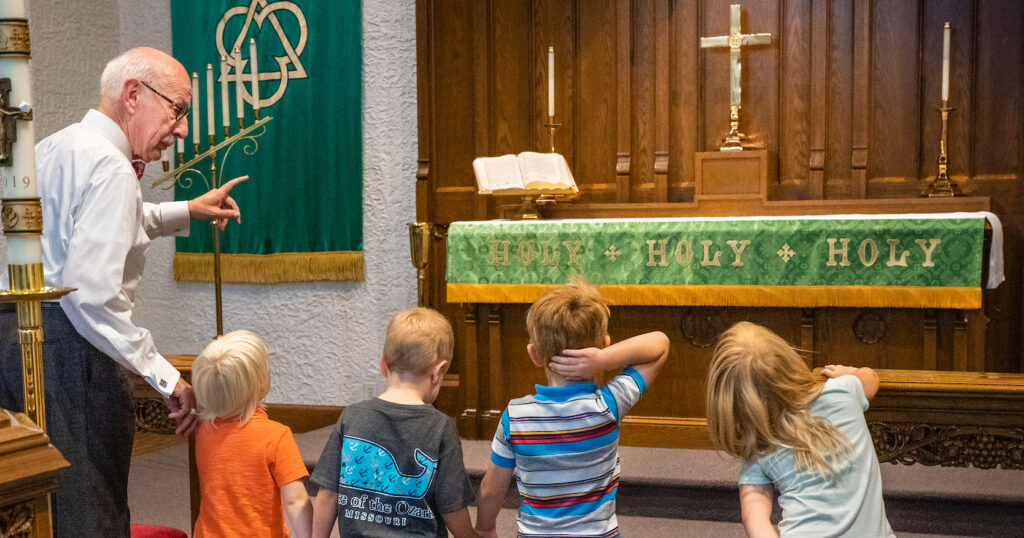By Anna Mussmann
On Transfiguration Sunday, Lutherans across America sing the hymn “’Tis Good, Lord, to Be Here” (LSB 414). Being in church is good. No matter how tired, distracted or apathetic we feel, when we come to church, we put ourselves where God has promised to work. We hear the Law and the Gospel. We receive Christ’s body and blood, given for us. St. Paul tells us not to “[neglect] meeting together, as is the habit of some” (Heb. 10:25). One of the blessings of meeting together is the time we spend with fellow Christians of all ages.
God’s enemies know that faithful congregations are highly effective at teaching the faith to the next generation. In Soviet Russia, this posed a problem for Nikita Khrushchev’s government. The Soviets had already sent thousands of pastors, priests and other Christians to labor and die in the Gulags. Yet they wished to maintain the propagandistic fiction that the USSR was the freest nation on earth. Their solution was to allow closely monitored congregations to exist, but to forbid all children from attending. It was an attempt to neutralize the church.
What an irony that for the last few decades American Christians have been repressing themselves. Around the year 2000, American church membership began abruptly to decline; now those who go regularly to church on Sunday are a statistical minority. The attrition is worst among the young. In America, it has not taken a Nikita Khrushchev to keep children out of church. American congregations are filled with older adults whose children and grandchildren no longer attend. Being part of the minority is hard. It leads to a tempting question: If our children are the only ones in church, is it really worth the effort of taking them there?
The answer is yes. It is hard work to feed, clean and dress small children and to wrangle them in a pew. It is hard work to teach them reverence and respect. It is sometimes embarrassing. Yet that is all the more reason why attending church with our families is a powerful confession of faith. Because it is hard, our willingness to do it anyway is a tiny echo of the confession made by Christian martyrs who willingly suffer death for Christ. It is a chance to witness to our neighbors, our children and even ourselves that Jesus comes to us here on earth — and that we need Him.
Do not fall for the lie that children “won’t get anything” out of Sunday morning because they “cannot understand” the liturgy and sermon. Our children had no need to understand the theology of Baptism in order for God to redeem them from sin. Our Lord works through His Word — surely we want to surround our children with that Word as often as possible. Besides, children are smarter than most adults give them credit for. When they hear Scripture, hymns and creeds on a regular basis, they have an opportunity to think through these words and ponder them in their hearts.
Church attendance shapes and teaches our children in another way, too. Habit and behavior are incredibly formative. When we consistently buckle our children into helmets and car seats, we teach them to value safety. When we consistently serve them healthy food, we teach them to enjoy good eating. When we consistently bring them to church, we teach them that they need Jesus and that Jesus is for them. He told us to let the little children come, and He meant it.
The challenge, of course, is that children in church are disruptive. I hope your congregation warmly welcomes them anyway. In my church, one of the members, an older gentleman who wears his Navy uniform on Veterans Day, always chuckles warmly when he sees small boys being particularly naughty. “Reminds me of me at that age,” he’ll say. Fortunately, children are good at learning. Teaching them is a valuable investment. As mama to five children, I’d like to share some of the teaching methods and expectations that have worked well for my family in church.
Rather than simply trying to keep them quiet, we involve even our toddlers in the service, and, as they grow, require an age-appropriate level of participation. Kids who are fully involved in the service are a lot less likely to be inappropriately noisy.
1. We communicate the idea that church is special and requires special behavior.
Making church an occasion helps kids realize its importance. Sunday is the day we serve a special breakfast — something that (a) they like, (b) is quick to eat, and (c) is packed with enough protein to keep their blood sugars balanced throughout the morning. Often this involves either baked oatmeal or eggs and bacon. We also make sure to dress the kids up. Clothing sets a tone, and even little boys like knowing they look good. Besides, most congregations will forgive any misdeed if it is committed by a toddler in a bow tie.
Before going into church, we remind our kids that we are going to use our “church behavior.” We talk about what that will look like. We remind them that we will face the front in order to see pastor and avoid distracting others. We will have calm bodies. We will keep our hands to ourselves. We will participate.
2. We use our bodies to participate.
One of the first church behaviors we require of our toddlers is to fold their hands during prayers. This may sound arbitrary, but it gives children an anchor to mark the pace of the service. They already understand the concept because we do it daily at home, and bringing it to church helps them pay attention to what the pastor is saying, even if only to listen for the word “amen.” Ultimately, it is another reminder that they are part of the congregation and that the service around us is for them, too.
Similarly, we teach them to sit when the congregation sits and stand when the congregation stands. While their legs are short, we let them stand on the pew during the Words of Institution so that they can see. As our kids grow, we teach them hymns and creeds at home so that they can enjoy singing with the congregation.
3. We provide Cheerios, not Oreos.
Sitting through church goes against most of the natural instincts of a small child. One way we ease the burden is by bringing a small bag of special items they can use during the sermon. Quiet toys, lift-the-flap books or crayons and paper work well. This is also a good time to ply the baby with a bag of Cheerios.
However, because we want our kids to learn to listen to the sermon as they mature instead of expecting entertainment, we make sure that the toys and snacks are babyish and easily outgrown. The six-year-old is less likely to be jealous when you say he does not need the stale Cheerios out of the diaper bag than if you were feeding the baby Oreos.
4. It is OK to require reasonable behavior from your children.
Some parents are afraid that requiring good behavior in church will create resentment and lead kids to hate church. However, it is part of the job of any good parent to teach kids how to behave in the world. As parents we require them to brush their teeth, wear their seatbelt, say thank you, and leave the playground when we call. It is part of our job to effectively exercise authority. We can require reasonable self-control in church and enforce our expectations with consequences when necessary. The goal is not perfection. Some children will find church far more challenging than others, and that is OK. What matters is that going to church is good.
None of us know the future. Someday our children will face grief, suffering, temptation and perhaps even persecution. We cannot control how they will respond. What we can do, however, is bear witness today that the answers they need are found in Christ. We do that each week when we take them to church to receive His gifts and to join in the communion of saints. It is good to be in church.
Cover image: LCMS Communications/Erik M. Lunsford






Thank you Mrs Mussman for encouraging those of us who endeavor to disciple our children in the gifts God gives us in Divine Service. We are one of the only families in our small urban congregation who faithfully bring our children & have then participate & contribute as much as they are able. It often gets very lonely for both us & our children. By God’s grace we saw the value of teaching them the faith at hone through memorization of Luther’s Small Catechism (thanks to CPH Sing the Faith CD!), liturgy (thanks to LCMS.org for providing free downloadable audio mp3s!) & real “adult” hymns from LSB (thanks to those posting LSB hymns online for is to learn from)! Some people have called us crazy for skipping over the “This Little Light of Mine” VBS songs, but we now have a 15 year old who is playing most of the D.S. settings & hymns for ours & other local rural LCMS congregations since he was 13 yrs old. We have younger kids who play hymns as ear tunes for their violin teacher & for special music at church services. And we are learning that our oldest son is not alone in learning the organ at an early age (& ability to play entire services for congregations) among families who catechize & disciple their children at home during the week. P.S. We didn’t do even Cheerios—too much work! We believed in the discipline of fasting during a one hour service! Hand lotion, lip balm & essential oils help to keep senses alert & hands busy as well as allowing simple pencil drawing & impromptu word searches in printed out bulletins.
Wonderful article! We need to model the various expressions of worship through our behaviour and attitudes. We show our respect for our gracious Lord and Saviour and for the other worshipers when we make this time “special” and we feel and see the blessings that follow.
And then they become teenagers — young people who are ever more inclined to think independently about many things, including the value of church involvement.
Jesus said, “It is more blessed to give than to receive” (Acts 20:35). Based on my own experience as a youth and what I have often observed in other young people since, I believe that as they mature it is highly beneficial to provide ample opportunities for them to discover how they can contribute in personally meaningful ways, and thereby experience how they can bless and inspire others with their gifts, to God’s glory and their own joy.
For Christ “gave himself for us to redeem us from all lawlessness and to purify for himself a people for his own possession who are zealous for good works” (1 Tim. 2:14 ESV).